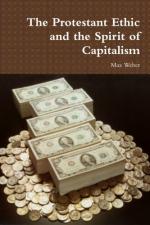|
This section contains 587 words (approx. 2 pages at 400 words per page) |

|
Chapter 1: Religious Affiliation and Social Stratification Summary and Analysis
In most developed countries, the vast majority of business leaders and owners of capital are Protestant. This extends beyond instances where the religious difference coincides with nationality as in Eastern Germany between Germans and Poles. It also remained popular whenever capitalism was free to alter the population for its needs and occupational structure. Leadership in capitalism involves having wealth, advanced education, and usually both. Personal wealth often originates from inheritance. Historically speaking, the most economically highly developed sectors of the sixteenth century tended to adapt to Protestantism and Protestant tenets.
The Reformation did not translate to the elimination of the Church's control over life; rather, it represented the substitution of a new form of control. The Catholic Church in the fifteenth century was considered lax in that it was accused of...
(read more from the Chapter 1: Religious Affiliation and Social Stratification Summary)
|
This section contains 587 words (approx. 2 pages at 400 words per page) |

|




